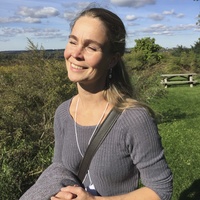Ebba Lisberg Jensen
Malmö University, Department of Urban Studies, Faculty Member
- Education, Ecology, Discourse Analysis, Urban Planning, Sustainable Development, Urban Studies, and 45 moreEthnography, Environmental Studies, Cultural Geography, Biodiversity, Rural Development, Urbanism, Critical Discourse Studies, Environmental Philosophy, Political Ecology, Environmental Education, Cultural Landscapes, Environmental Policy and Governance, Sustainable Urban Environments, Environmental Anthropology, Environmental Ethics, Ecological Economics, Conservation Ecology, Environmental Sociology, Diversity, Ethics & Social Sustainability, Indigenous Knowledge, Ethnobotany, Environmental Psychology, Resilience, Bodies and Culture, Environmental Justice, Ecosystem Services, Biodiversity and Ecosystem Function, Environmental Health, Applied Anthropology, Sustainability in Higher Education, Countercultural Studies, Traditional Ecological Knowledge, Modernization, Local Identities, Ecological Justice, Local Development, Arctic Social Science, Place Attachment, European Ethnography, Environmental literacy, Historic Landscapes, Restorative Environments, Chicago School, and Environmental Sustainabilityedit
This article deals with the process of change from industrial land to recreational area on a 60 ha piece of land 12 km southeast of Malmo ̈ , southern Sweden, called Lake Arrie. The area is an abandoned gravel quarry in the midst of an... more
This article deals with the process of change from industrial land to recreational area on a 60 ha piece of land 12 km southeast of Malmo ̈ , southern Sweden, called Lake Arrie. The area is an abandoned gravel quarry in the midst of an agricultural landscape. We present a short background and the current situation in Arrie, setting out to capture the tendencies of the contemporary construction of nature for outdoor recreation. We then move on to discuss the salutogenic aspects of outdoor recreation, and how these can be traced in the actual landscape at Arrie. Furthermore, we open the discussion on diversity as a cherished post-modern ideal both in nature and culture. Key words: Cultural and biological diversity; Outdoor recreation; Participatory planning; Post-industrial; Public health; Urban
Research Interests:
The Inner Settlement of Swedish Norrland : model of an extractive periphery ? This article deals with the historical and current socio-economic situation of the northern interior of Sweden. Its forestal resources, hydro-energy and... more
The Inner Settlement of Swedish Norrland : model of an extractive periphery ?
This article deals with the historical and current socio-economic situation of the northern interior of Sweden. Its forestal resources, hydro-energy and minerals have all been heavily extracted to the benefit of the Swedish state, forming a basis for the development of Sweden as a highly modernised wellfare-state. The environmental, cultural and economic costs for the Norrland regions are here analysed from the perspective of world system theory, seeing accumulation of wealth in central regions as dependent on the deprivation of geographical and economic peripheries. Today, the high-days of the extraction era are over, and researchers, politicians and civilians all suggest different solutions.
Extraction, Global theory, Internal colonization, Periphery, Sweden, Swedish Norrland
This article deals with the historical and current socio-economic situation of the northern interior of Sweden. Its forestal resources, hydro-energy and minerals have all been heavily extracted to the benefit of the Swedish state, forming a basis for the development of Sweden as a highly modernised wellfare-state. The environmental, cultural and economic costs for the Norrland regions are here analysed from the perspective of world system theory, seeing accumulation of wealth in central regions as dependent on the deprivation of geographical and economic peripheries. Today, the high-days of the extraction era are over, and researchers, politicians and civilians all suggest different solutions.
Extraction, Global theory, Internal colonization, Periphery, Sweden, Swedish Norrland
Research Interests:
Does knowledge of nature automatically lead to an environmental awareness and a willingness to save nature? Sweden has a more than century-long tradition of outdoor education and learning about species, often referred to as the "linnean"... more
Does knowledge of nature automatically lead to an environmental awareness and a willingness to save nature? Sweden has a more than century-long tradition of outdoor education and learning about species, often referred to as the "linnean" tradition, after the famous Swedish botanist Carl Linnaeus. The question whether this tradition has helped inspiring or making Swedish pupils and students more geared towards environmentalism, thus promoting a more sustainable society, is discussed in this paper.
Research Interests:
On the discourse of modernity in Swedish forestry, and its dissolution into postmodern ideas of diversity in landscape, forestry and biology, with the help of an environmental activism enhanced by economic strategies and ethical and... more
On the discourse of modernity in Swedish forestry, and its dissolution into postmodern ideas of diversity in landscape, forestry and biology, with the help of an environmental activism enhanced by economic strategies and ethical and aesthetical change.
Research Interests:
This chapter examines outdoor recreation from a cultural analysis perspective, with a focus on language and ecological literacy. The chapter is based on two focus group studies, conducted in field, in an area just outside Malmö, southern... more
This chapter examines outdoor recreation from a cultural analysis perspective, with a focus on language and ecological literacy. The chapter is based on two focus group studies, conducted in field, in an area just outside Malmö, southern Sweden. One of the groups consisted of middle-aged and older Arabic-speaking women with a background in a number of countries in the Middle East. The other group had the same mix of national origins. The two groups, as it turned out, represented contrasting life-styles in terms of traditionalism/modernity, ruralism/urbanity and in knowledge of species in their first language and in Swedish, i.e. their "ecological literacy".
Research Interests:
Research Interests:
Research Interests:
Research Interests:
This book is the result of a research project investigating the outdoor recreation habits, preferences and ecological literacy of different ethnic groups in Sweden.
